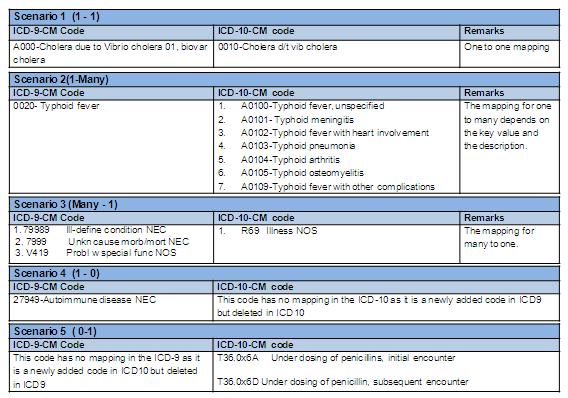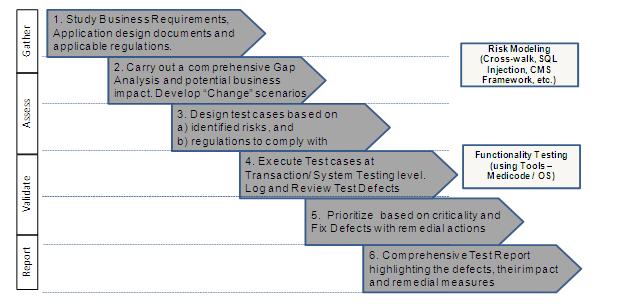Healthcare Regulatory Compliance Services
— Adopting new regulatory standards in the US Healthcare Industry
The purpose of this paper is to provide a clear understanding of HIPAA and ICD migration, analyze the benefits beyond ICD remediation by providing regulation insights, and discuss the impact of the new regulations on systems, processes, payers, providers, pharmacies, laboratories, and Intermediaries, healthcare organizations, and the industry in general. In addition, it provides insight on the implementation in the healthcare ecosystem.
Industry Challenges:
The two major US healthcare regulatory compliance mandates are, HIPAA migration from 4010 to 5010 electronic transaction set and conversion of ICD-9 code set to ICD-10 code set. Implementation of these mandates will impact every core process, system and interface across the industry and will require a major overhaul in healthcare organizations.
The government has stated specific time lines within which migration and replacements have to be completed.
- HIPAA 5010 Compliance is to be completed by January 1, 2012. All electronic claims provided after this date must use Version 5010 and Version 4010 claims will no longer be accepted.
- ICD-10 Compliance is to be completed by October 1, 2013. Claims for services provided on or after this date must use ICD-10 codes for medical diagnosis and inpatient procedures.
Migration of ICD 9 to ICD 10 and meeting the compliance deadline of October 2013 will require a significant amount of awareness, planning and preparedness on the part of payers as well as healthcare professionals. Network management, claims re-pricing, and Provider Contracting constitute the biggest concerns for ICD-10 and HIPAA transition. Integration between web-based technology and administrative services to improve consumer experience is another major challenge for ICD-10 and HIPAA transition. The conversion will also largely impact rating, underwriting, and actuarial policies and guidelines in the Healthcare industry.
In order to meet the compliance deadline and increase the success rate of ICD compliance, payers need to work out a strategic approach to manage change and maximize benefits out of investments. The immediate need is to start the effort with an overall governance structure and manage the transition and mitigate the risks.
HIPAA 5010 Migration
The adoption of HIPAA 5010 is imperative to enable ICD-10 implementation. It involves adopting new guidelines for claims, eligibility inquiries, referral authorizations, remittance advices and other transactions. The migration process adopts an updated version of the National Council for Prescription Drug Programs (NCPDP) standard and a standard for Medicaid pharmacy subrogation transactions.
These new HIPAA regulations have various organizational and technical implications in the industry. Healthcare providers, pharmacy benefit managers, doctors and other enterprises operating in the industry are implementing new standards in order to facilitate the interoperability of stakeholder systems and drive efficiencies.
In order to implement HIPAA migration, there are some basic changes that organizations need to make.
Typical Changes for HIPAA Migration—
- Front Matter Changes – the purpose and business rules related to the transaction under consideration needs to be identified.
- Technical Improvements – facilitation of effective accommodation of the transaction data collected and transmitted, as well as ensuring that the transmitted data is more comprehensible.
- Structural changes – incorporating modifications to the physical data element components of the transactions.
ICD-10 Migration
The US Department of Health and Human Services (HHS) has proposed a regulation that will replace the ICD-9-Clinical Modification code sets (used to report healthcare diagnoses and procedures), with the new advanced and expanded ICD-10 code sets. The challenge that is being currently being addressed is the transition to new ICD-10 coding. It involves a major overhaul of the current coding systems in all Healthcare organizations. Considering the confidentiality of medical records, automation and up gradation of IT systems require immediate attention.
Migration of migrate from ICD-9 to ICD-10 code sets, involves a major system overhaul, leading to the following changes:
- Increased code set from 18000 to ~140000 and
- Structural changes for the codes to Alphanumeric from Numeric format
- Code size increased from 5 to 7 character length and leading to higher data volume
Typical Changes for ICD-10 Migration
- Increased code sets – accommodation of increased code sets from 18000 to ~140000.
- Increased code sizes – increasing the character length from 5 characters to 7 characters to enable higher volumes of data.
- Structural changes – incorporating change in codes from numeric to alphanumeric formats
Business Benefits of migration to ICD 10 and HIPAA 5010
The benefits of migrating to advanced regulatory standards of ICD-10 and HIPAA 5010 are:-
- Facilitating interoperability of stakeholder systems and drives efficiencies.
- Enhancing usability and effectiveness of transactions such as claims, eligibility inquiries, referral authorizations, remittance advices and other transactions.
- Enabling integration of codes of different versions across systems in the industry.
- Providing standardization of interoperability guides between systems across the industry.
- Increasing protection of personal medical information (PMI) through limiting ways in which information is shared.
- Assisting healthcare consumers in purchasing appropriate health insurance coverage.
- Enabling easier accessibility of individual records by patients.
GSS' Solution for Code Conversion: GSS Infotech Experience and Expertise
GSS Infotech provides software and services that can be customized and implemented based on your organizational needs for compliance mandates. The Medicode, an e-learning tool by our expert services, helps not only cut down on the time and human resources required for transition to ICD-10, but also ensures accuracy and consistency in code count and conversion. The tool is a powerful web-based solution, designed to guide your experts through the process of translating codes throughout your business systems and processes to help you maintain your financial health.
MEDICODE: GSS e-learning solution for ICD Code Conversion
Medicode, the e-learning tool by GSS Infotech is a conversion and translation application that helps create mappings built specifically to meet particular needs in your organization. The complete content of the public domain General Equivalence Mappings (GEMs) is fully integrated into the tool, which performs automated translation where straightforward one-to- one relationship exists.
With its user-friendly interface, this tool then isolates complex translation issues and provides tabular and index information from both code sets, along with reference data, to help the user resolve issues in a conversion or mapping project. The tool helps the user identify those critical code translations that require a decision in order to create an accurate map for your business purpose.
The tool helps in simplifying the complex task of modeling and translating ICD-9 codes to ICD-10 in your health information systems.
- Assists the team in preparing ICD-9 based systems for the complex transition to ICD-10
- Provides the ICD-10 expertise and clinical knowledge the team needs to make complex code translation decisions
- Models and configure embedded ICD-9 codes to support code translation
- Helps the IT team export translated ICD-10 codes to the health information systems
This tool also helps in understanding the ICD migration better. It can work independently to assist you in the simpler and faster transition of 4010 to 5010 standards and ICD-9 to ICD-10code-sets in the following ways:
- A powerful translation solution for maximizing effort on your ICD-10 transition strategy
- Automates much of the ICD-10 translation, substantially reducing costs and time spent
- Promotes optimal resource efficiencies and focus by becoming your expert technology for ICD-10 code translation
GSS MEDICODE Tool Advantage
- The tool helps in translation of the majority of ICD-10 codes automatically and then identifies translation issues for your in-house experts to resolve according to the objectives of your health information applications.
- Helps the providers, health care centers and hospitals for easily converting the ICD codes.
GSS Testing Services for ICD 10 Conversions
At GSS, we run our product, i.e., Medicode through several test phases to ensure the best quality and maximum outcome that can be derived out of it. GSS Testing strategy for ICD 10 conversion is developed based on the fundamental governing principles of Software Validation.
- Comprehensive understanding on user requirements and usage conditions
- Parametrization of the system
- Pre-defined expected test outcomes
- Test cases to have high probability of exposing errors in the system
- Possibility of re-use of test cases during post deployment enhancements
- Lower life cycle costs (initial + recurring) of testing and verification
- Good coverage and traceability of requirements
- Enhanced upstream quality of the system
The key considerations for effective Testing and assuring defect free applications in this ICD 10 conversion engagement are derived by our Testing experts through a brainstorming discussion.
1. Involvement of the Testing teams during the early stages, after the finalization of requirements.
2. Test strategy in terms of —
- Risk assessment based on methodology chosen for ICD-10 conversion by the development team/capabilities/automation of the processes /tools used, etc.
- Testing types, automation scope and use of testing tools
3. Collaboration with development team in terms of overall timelines/dependencies, etc.
4. Configuration management to ensure the synchronization of changes with respect to the implementation scope
The critical success factors derived are summarized in the table given below:
 |
Our Testing panel has studied the overall scope of the ICD-10 conversion and has highlighted the following 5 unique scenarios from the GEMS framework. These 5 scenarios form the basis of overall changes between ICD 9 and ICD 10. These 5 scenarios are detailed in the table below.
The unique Testing approach proposed for a seamless conversion and effective deployment in production is broadly split into 6 stages as illustrated in the pictorial diagram below:
Essentially, testing will be focused on changes in code and database of the applications.
- Online Screen changes (Front end Screen changes)
- Data Structure changes (Files, Databases)
- Interoperability
- Analytical changes in applications with respect to ICD-10 coding system
- Cross Functional Transactions - End-to-End testing
- Scenario based testing (scenarios with mappings such as 1:1, 1:Many, Many:1, None between ICD-9 and ICD-10)
Based on our research and overall understanding, we believe the following types of Testing is required to assure the complete conversion and functioning of the applications with the new ICD 10 codes.
1] Functional Testing (ST/RT)
- Transactions (end-to-end)
- Data Integrity Testing
- Stored Procedures Testing
- Data Type and Size Testing
- Input Items validation Testing
4] Security Testing
The GSS Infotech Advantage
As a renowned IT services provider with end-to-end capabilities, GSS Infotech helps you in efficient ICD-10 translation. We have the right people with the right skill set required for healthcare organizations, helping them with compliance mandates such as HIPAA and ICD conversion. GSS approach is supported by proprietary in-house regulatory compliance suite to accelerate the transition, while saving costs.In order to help you adopt the new coding system, GSS Infotech offers comprehensive consulting, education, training and specialized end-to-end testing (both internal and external trading partner). In addition, the experts provide customized solutions to meet your specific requirements for simpler and faster transition.
Conclusion:
HIPAA migration from 4010 to 5010 electronic transaction set and conversion of ICD-9 code set to ICD-10 code set marks a major paradigm shift in the healthcare domain for payers as well medical practitioners. Enterprises have already begun to adopt changes in core processes, systems and interfaces. Moreover, with specific timelines stated by the government, organizations need to think strategically and come up with a clearly defined roadmap for compliance and situations beyond it.
About GSS Infotech
GSS Infotech with a mission of providing innovative managed IT services at a committed quality and optimal cost leveraging Technology, Thought Leadership and Global Delivery Model, with experienced professional with proven expertise in the healthcare domain would like to support customers in smooth transition for ICD and HIPAA, and provides customized solutions to comply industry standards.

